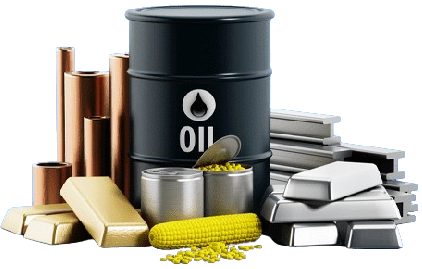Commodities
Trade a variety of popular commodities, and access some of the world’s biggest oil and natural gas markets
Buy and sell CFDs on spot commodities with tight spreads and spot execution directly on your MT5 platform

Liquidity & inflation-resistant
Liquidity & inflation-resistant Deep liquidity and inflation resistance make this asset class appealing to traders of al levels.

Oil CFDs' popularity
Oil CFDs are highly favored due to their connection to global economic conditions.

Portfolio Diversification
CFDs on most popular commodities provide portfolio diversification and risk hedging.

Low-Cost
Low cost entry to commodity trading allows borders participation in the market.
Commodities Trading
Understanding Commodities in Global Markets
Commodities are fundamental items crucial to the global economy, encompassing everything from gold and silver to coffee. These goods are traded worldwide across various exchanges, often through future contracts.
ALS Markets offers a unique way to engage in the commodities market through Contracts for Difference (CFDs). These financial instruments are based on the price movements of underlying assets without requiring you to own the physical goods. This feature is appealing to traders, as it allows them the flexibility to trade commodities at their convenience, capitalizing on market opportunities without the complexities of physical ownership.

Types of Commodities in the Market
Commodities are essential goods used in business or markets, and when traded on exchanges, they must comply with set standards and grades. While commodities can vary slightly among producers, they remain fundamentally similar. Commodities are categorized into two main types: soft and hard.
Soft Commodities
Soft commodities include agricultural products that are grown rather than mined. Examples include sugar, corn, wheat, and coffee. These commodities are produced by farmers and are highly sensitive to climate and weather changes, which influence their cyclical price patterns based on seasonal variations.
Hard Commodities
Hard commodities encompass items that are mined, such as gold, other precious metals, diamonds, and oil, along with various energy products. These commodities typically involve extraction and mining processes and are integral to industries and economies worldwide.
Understanding the differences between soft and hard commodities helps traders and investors navigate market dynamics effectively, optimizing their commodity trading strategies.
What Factors Influence Commodity Prices?
Supply and Demand: Commodity prices are primarily influenced by the balance of supply and demand. When supply matches demand, prices tend to remain stable. However, if the market anticipates a decrease in supply due to factors like adverse weather or production cuts, prices generally increase. Conversely, an increase in supply often leads to lower prices.
Inflation: Inflation also plays a significant role in determining commodity prices. As inflation rises, the prices of commodities typically adjust accordingly, reflecting changes in purchasing power and costs.
Stock and Inventories: Various factors can impact the production and availability of commodities, thereby influencing prices. These include weather conditions, crop diseases, production challenges, and external factors such as political and economic environments. Additional costs arising from taxes, trade laws, and government subsidies can also affect commodity prices.
Understanding these factors is essential for investors and traders to make informed decisions about commodity markets and to navigate market fluctuations effectively.
Trade Commodities with ALS Markets
- Spreads from 0.3 Pips
- All trading strategies enabled
- 24/5 Trading

Three types of accounts, catering to every trader, whether you are a beginner or experienced.
Nano Account
$100/ Min Deposit
Ideal for new and intermediate traders
- Leverage up to 1:400
- Spread starting from 1.6 pips
- MT5 with EAs & 80+ technical tools
- ECN tech with Tier liquidity
- Access to advanced educational tools
- No Dealing Desk intervention
Standard Account
$1000/ Min Deposit
Tailored for experienced traders
- Leverage up to 1:400
- Spread starting from 0.5 pips
- MT5 with EAs & 80+ technical tools
- ECN tech with Tier liquidity
- Access to advanced educational tools
- No Dealing Desk intervention
Pro Account
$25000/ Min Deposit
Suited for seasoned traders & Investors
- Leverage up to 1:200
- Spread starting from 0.3 pips
- MT5 with EAs & 80+ technical tools
- ECN tech with Tier liquidity
- Access to advanced educational tools
- No Dealing Desk intervention
